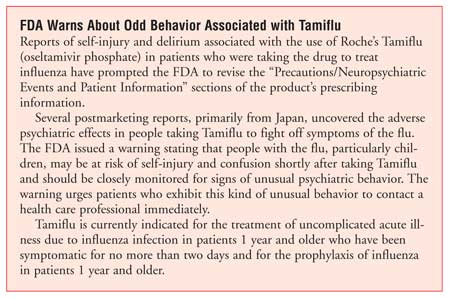US Pharm. 2006;12:58.

Tomatoes Served in Restaurants
Linked to Salmonella
An FDA
investigation conducted in conjunction with the Centers for Disease Control
and Prevention (CDC) found that tomatoes consumed in restaurants were the
cause of illness in the Salmonella typhimurium outbreak last
month. At press time, 21 states had reported 183 cases of illness to the CDC.
While FDA identified three states in particular (Minnesota, Massachusetts, and
Connecticut) as having "groups of illnesses," it believes that the outbreak
has peaked and is not ongoing; therefore, FDA will not issue a consumer
warning about tomatoes currently being sold in stores.
Salmonella can cause serious and sometimes fatal infections in young children, frail or elderly people, and others with a weakened immune system. Healthy persons often experience fever, diarrhea (which may be bloody), nausea, vomiting, and abdominal pain. In rare circumstances, infection can result in the organism getting into the bloodstream and producing severe illness.
FDA Strengthens Its Postmarket
Program for Medical Devices
The FDA announced
it is stepping up efforts in monitoring the safety of medical devices after
they reach the marketplace. According to Scott Gottlieb, MD, FDA's Deputy
Commissioner for Medical and Scientific Affairs, while the newer medical
devices have benefited millions of people, they are smaller and more complex
than ever before and their "technical sophistication sometimes means that the
margin for error with device manufacturing shrinks, and so we need to be
working even harder, after devices and engineering changes are approved, to
monitor for potential safety problems."
Earlier in the year the FDA's Center for Devices and Radiological Health formed a Postmarket Transformation Leadership Team to develop an action plan focusing on four main areas: enhancement of the Center's culture of collaboration; development of world class data systems; enhancement of risk/benefit communications efforts; and collaboration on improved enforcement strategies and outcomes.
First Generic Metronidazole
Receives FDA Approval
The FDA has
approved the first generic version of MetroGel-Vaginal (metronidazole vaginal
gel), indicated for the treatment of bacterial vaginosis. Metronidazole
Vaginal Gel, 0.75%, is manufactured by Fort Collins, Colorado–based QLT USA,
Inc. The company successfully challenged certain patents for the branded drug,
MetroGel-Vaginal, manufactured by 3M Health Care. It is therefore eligible for
180 days of generic drug exclusivity. Other generic drug companies seeking
approval for a generic version of the same branded product must wait until the
exclusivity period has expired.
Bacterial vaginosis is a condition in women that is characterized by vaginal discharge resulting from an overgrowth of bacteria in the vagina. Gary J. Buehler, RPh, Director of the FDA's Office of Generic Drugs, hails the approval as a "significant savings to the millions of Americans" who use the product to treat vaginosis.
To comment on this article, contact editor@uspharmacist.com.






